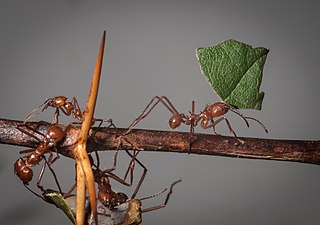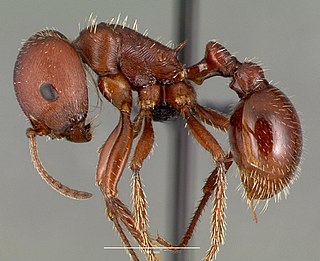
The broad-headed skink or broadhead skink is species of lizard, endemic to the southeastern United States. The broadhead skink occurs in sympatry with the five-lined skink and Southeastern five-lined skink in forest of the Southeastern United States. All three species are phenotypically similar throughout much of their development and were considered a single species prior to the mid-1930s.

Myrmicinae is a subfamily of ants, with about 140 extant genera; their distribution is cosmopolitan. The pupae lack cocoons. Some species retain a functional sting. The petioles of Myrmicinae consist of two nodes. The nests are permanent and in soil, rotting wood, under stones, or in trees.

Pogonomyrmex is a genus of harvester ants, occurring primarily in the deserts of North, Central, and South America, with a single endemic species from Haiti.
Hylaeamys laticeps, also known as the Atlantic Forest oryzomys or the large-headed rice rat, is a species of rodent in the family Cricetidae.
Limnerpeton is an extinct genus of dissorophoidean euskelian temnospondyl within the family Amphibamidae.

Lachnomyrmex amazonicus is a species of ant in the subfamily Myrmicinae.

Lachnomyrmex fernandezi is a species of ant in the subfamily Myrmicinae.

Lachnomyrmex longinoi is a species of ant in the subfamily Myrmicinae found in Honduras, Nicaragua, Costa Rica.

Lachnomyrmex regularis is a species of ant in the subfamily Myrmicinae.

Lachnomyrmex victori is a species of ant in the subfamily Myrmicinae.

Sapheosaurus was an extinct genus of Late Jurassic sphenodont. Its skull was longer and narrower than that of Homoeosaurus. It was classified as a genus of sapheosaur by Michael Benton in 1985. It reached a length of 70 cm from snout to tail. Sapheosaurus belongs to the clade Sapheosauridae, that also includes other taxa like Kallimodon. It is believed to be one of two aquatic sphenodont lineages, with Pleurosauridae being the other.
Acromyrmex laticeps is a species of leaf-cutter ant, a New World ant of the subfamily Myrmicinae of the genus Acromyrmex. This species is from one of the two genera of advanced attines within the tribe Attini.

Simopelta is a Neotropical genus of ants in the subfamily Ponerinae.

Bothriomyrmex is a genus of ants in the subfamily Dolichoderinae.

Lachnomyrmex is a Neotropical genus of ants in the subfamily Myrmicinae. The genus consists of 16 species restricted to the Neotropics, known from southern Mexico to northern Argentina. They are most often found in the leaf litter of wet forests, with nests located on the ground. Workers forage alone, apparently without recruiting nestmates or using pheromones. Within the tribe Stenammini, they seem to be most closely related to the genera Lordomyrma of Indo-Australia and Cyphoidris of Africa.

Melophorus is a genus of ants in the subfamily Formicinae. The genus is endemic to Australia, where its species are common in arid and semiarid areas.
Kotshkorkia is an extinct genus of ants of the subfamily Dolichoderinae. The genus contains a single described species Kotshkorkia laticeps. It was described by Dlussky in 1981, where the first fossils of the ant were found in Russia.
Agastomyrma is an extinct genus of formicid in the ant subfamily Myrmicinae known from the fossil species Agastomyrma laticeps found in eastern Asia.

Zootermopsis laticeps, known generally as Arizona dampwood termite, is a species of termite in the family Archotermopsidae. Other common names include the wide-headed rottenwood termite and southwestern rottenwood termite. It is found in arid parts of south-western North America.
Mattauschia is an extinct genus of trematopid temnospondyls from the Late Carboniferous of the Czech Republic.














